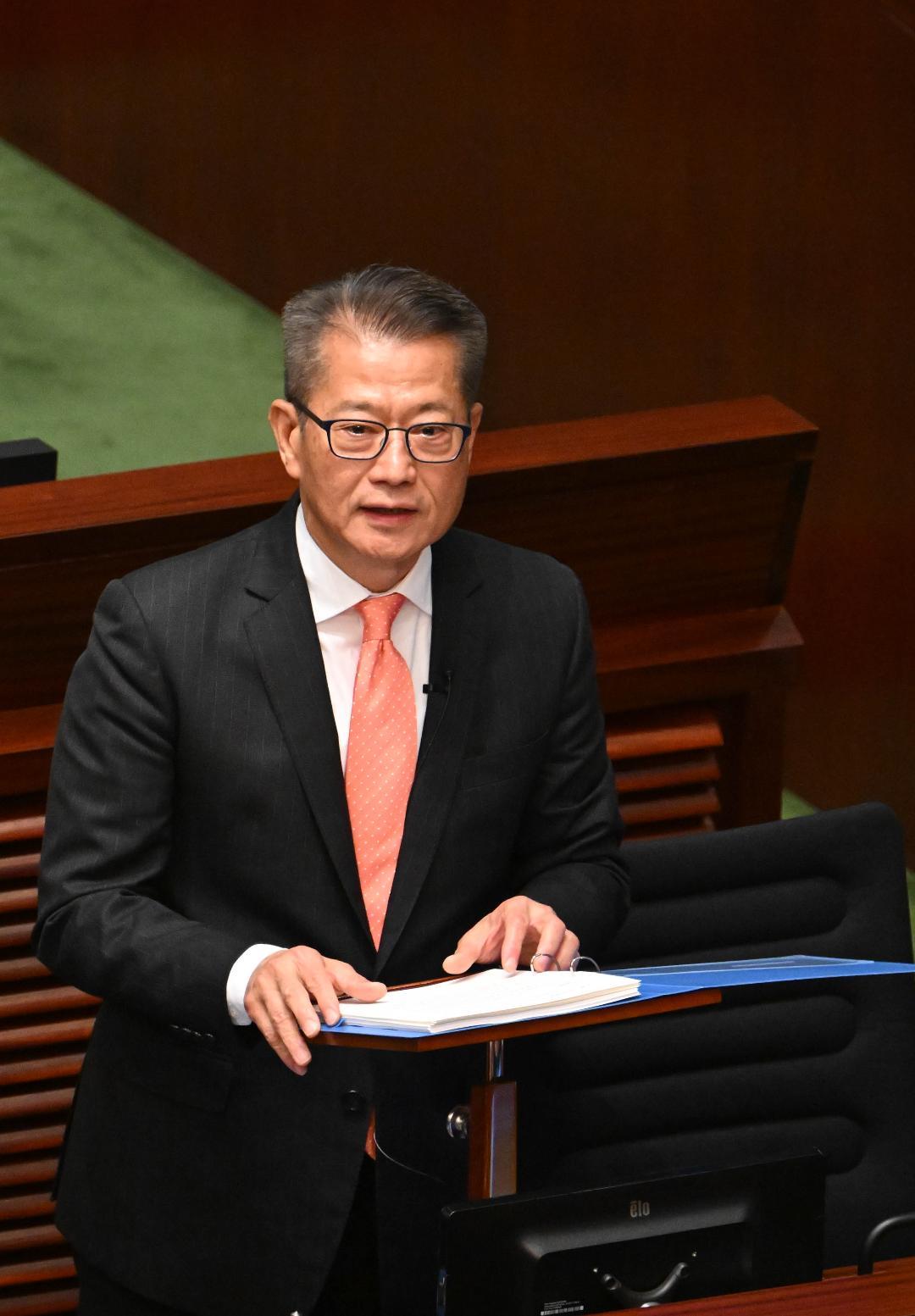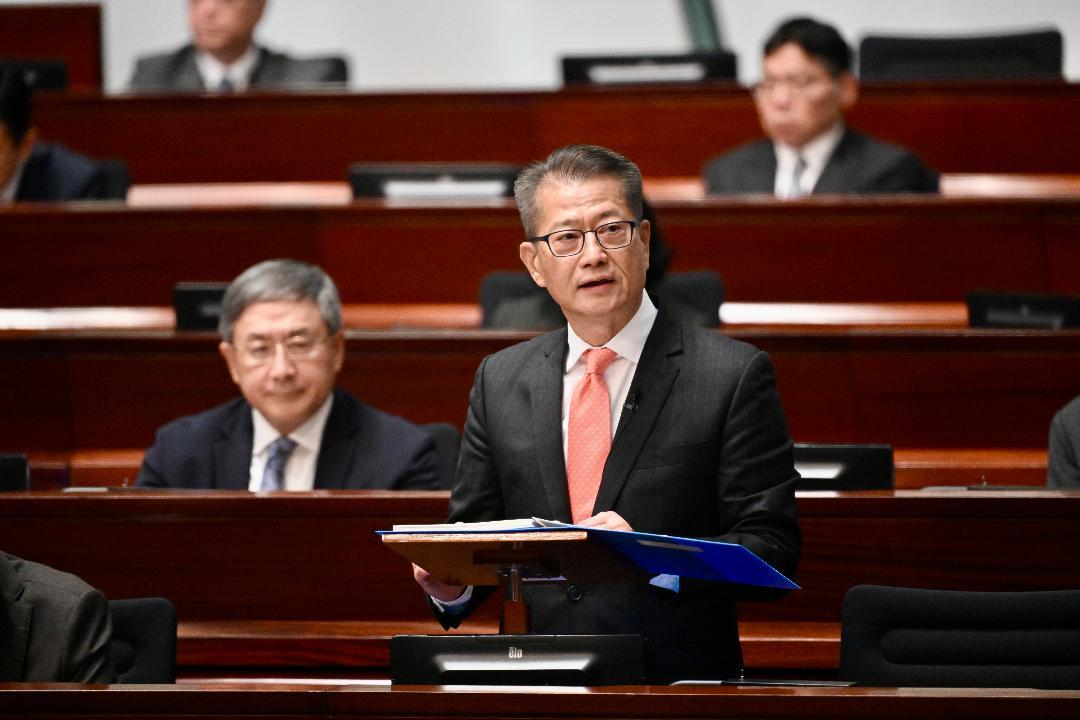Budget Speech by the Financial Secretary (1) (with photos/video)
****************************************************************
Mr President, Honourable Members and fellow citizens,
I move that the Appropriation Bill 2024 be read a second time.
Introduction
2. During the past year, Hong Kong has returned to normalcy after the epidemic. The society and the daily lives of our people are back to normal as they have longed for. Visitors are returning, and our economy is regaining positive growth. A series of mega events have helped to restore a buoyant mood in the community.
3. Meanwhile, geopolitical uncertainties and high interest rates have impacted capital flows. Resumption of outbound travel, changes in consumption patterns and a shift in inbound visitors' preferences, along with competition from other economies and so forth have all weighed down economic confidence.
4. Amid a complicated and ever-changing international environment, and with our economy and society constantly evolving, more strenuous efforts are required to strengthen momentum of our economic recovery. While the uneven pace of recovery across industries merits our attention, there are also certain constraints that need to be unravelled in a gradual manner.
5. Innovation and technology as well as data empowerment will catalyse the emergence of new business models, however they will also heighten competition and pose challenges to many enterprises. Through vigorous promotion of innovative research and transformation of its outcomes as well as acceleration of digital transformation in recent years, we are well-equipped to navigate the changes.
6. Underpinned by our country's firm and steady development, our institutional advantages under "One Country, Two Systems" and our highly international characteristics, Hong Kong will attract yet a bigger pool of talent, capital and enterprises. I have absolute confidence in Hong Kong's future.
7. Our public finances, nevertheless, need consolidation as the epidemic subsides. Upon a full and thorough evaluation, we will adopt a fiscal consolidation strategy to narrow our fiscal deficit progressively towards achieving the goal of restoring fiscal balance.
8. The theme of this Budget is: "Advance with Confidence. Seize Opportunities. Strive for High-quality Development." I will elaborate on this a little later.
Economic Situation in 2023
9. In 2023, the Hong Kong economy returned to normalcy in the aftermath of the pandemic. Economic activities showed improvement immediately following the removal of anti-epidemic measures and the resumption of normal travel early in the year, though the difficult external environment continued to constrain the pace of growth. For the year as a whole, the economy grew 3.2 per cent. Incomes of the general public recorded growth in real terms.
10. Private consumption expenditure increased 7.3 per cent in real terms last year, supported by the Government's Consumption Voucher Scheme, activities and initiatives such as "Happy Hong Kong" and "Night Vibes Hong Kong" and the continuing increase in household income. Overall investment expenditure also rebounded, by 10.8 per cent, alongside the economic recovery.
11. Visitor arrivals bounced back sharply, to about 34 million last year, with fourth-quarter arrivals recovering to 58 per cent of the same period in 2018. Exports of travel services soared for the year, while exports of transport services increased in tandem, bringing about notable growth of 21.2 per cent in total exports of services for the year as a whole.
12. Nonetheless, the challenging external environment continued to affect Hong Kong's export performance. Heightened geopolitical tensions severely undermined economic confidence around the world. Central banks of the advanced economies raised interest rates sharply to tame inflation, tightening global financial conditions and dampening import demand for goods. The International Monetary Fund (IMF) estimated that global economic growth slowed to 3.1 per cent last year. Against this backdrop, Hong Kong's total goods exports fell notably by 10.3 per cent last year.
13. The labour market continued to improve. The seasonally adjusted unemployment rate declined from 3.5 per cent in the fourth quarter of 2022 to the latest 2.9 per cent. The median monthly employment earnings of full-time employees increased 8.6 per cent, year-on-year, in the fourth quarter of last year.
14. Inflation remained moderate in overall terms. While prices of individual items such as energy, clothing and footwear, as well as meals out and takeaway food, rose visibly, price pressures faced by other major components were largely contained. Netting out the effects of the Government's one-off measures, the underlying inflation rate was 1.7 per cent last year.
15. The local stock market consolidated through most of 2023, and trading activities shrank. The Hang Seng Index, once again supported by economic activities, returned to normal at the beginning of the year. The market softened subsequently, however, with the Hang Seng Index falling 13.8 per cent in 2023, alongside weakened market confidence in the Mainland economy and expectations of interest rates remaining high.
16. As for residential property, market sentiment has become very cautious since the middle of last year amid rising interest rates and an external environment fraught with uncertainties. Flat prices fell seven per cent during the year. The number of transactions declined by five per cent, to a low level of about 43 000. The non-residential property market was largely quiet.
Economic Outlook for 2024 and the Medium Term
17. The external environment remains complicated. Geopolitical tensions will continue to impact international trade and capital flows, and may cause disruption to global supply chains. Sharply tightened financial conditions over the past two years will continue to constrain the growth rate of advanced economies. That said, the market widely believes that the US Federal Reserve will start cutting rates this year, though the timing and magnitude of rate cuts are still uncertain. Last month, the IMF forecast that global economic growth would remain at 3.1 per cent this year, below the average annual growth rate of 3.8 per cent between 2000 and 2019.
18. The Mainland's export performance this year will continue to be affected by the external environment. The Mainland economy, however, is resilient, with solid fundamentals. Our country's measures for boosting the economy are progressively taking effect, and there is still sufficient policy room to further support the economy. Domestic demand should improve, and the Mainland economy is expected to register steady growth this year.
19. Among advanced economies, the US this year is expected to realise lower economic growth than last year, as the lagged effects of rate hikes over the past two years continue to surface. Nevertheless, if the Federal Reserve, as expected, starts cutting interest rates, there would be some support for the economy. As consumption growth in the US was more concentrated in services over the past two years, demand for goods may grow faster this year and render support to global trade. For Europe, economic growth is expected to remain weak this year amid geopolitical tensions and the lack of significant improvement in external demand.
20. The external environment will continue to put pressure on Hong Kong's exports of goods. But global monetary conditions may ease progressively over the course of the year, which would bode well for export performance.
21. On the other hand, with the continued revival of handling capacity, particularly air passenger capacity, and the Government vigorously promoting mega event economy, visitor arrivals are expected to increase further, driving growth in exports of travel and other related services.
22. Moreover, rising incomes among the general public will continue to support private consumption. Successive Government measures will help lift consumption sentiment as well. Fixed asset investment should also increase alongside continuing economic growth.
23. Having regard to the above factors, we forecast that the Hong Kong economy will expand further this year, with growth of 2.5 to 3.5 per cent in real terms for the year as a whole.
24. Domestic cost pressures are expected to increase alongside the economic recovery. External price pressures, however, should ease further, though persisting geopolitical tensions may pose upside risks. We forecast an underlying inflation rate and headline inflation rate of 1.7 per cent and 2.4 per cent, respectively, this year.
25. In the medium term, the Hong Kong economy will see sustained and solid development. While geopolitical tensions will continue to impact international capital flows and trade patterns, and the expansionary fiscal and monetary policies vigorously pursued by most economies during the pandemic have also added vulnerabilities to the global economy and financial system, global demand should be able to revive gradually in tandem with the anticipated progressive declines in interest rates in the US and the euro area in the coming few years. More importantly, our country's focus on promoting high-quality development will provide Hong Kong with ample room to grow.
26. The National 14th Five-Year Plan has set a clear positioning for Hong Kong's development of the "Eight Centres". Future prospects will be bright, as long as Hong Kong steadily forges ahead by leveraging its unique advantages under "One Country, Two Systems", proactively integrates into the overall national development, aligns with national development strategies, and continues to perform the role of an important node in the domestic and international dual circulation of our country. The Government's efforts in expanding economic capacity, enhancing competitiveness and cultivating new growth areas will also enable Hong Kong to seize opportunities when the global economic situation improves, enhancing its medium- to long-term growth momentum.
27. Based on the above considerations, we forecast that the Hong Kong economy will grow by an average of 3.2 per cent a year in real terms from 2025 to 2028. The underlying inflation rate is forecast to average 2.5 per cent a year.
(To be continued.)
Ends/Wednesday, February 28, 2024
Issued at HKT 11:13
Issued at HKT 11:13
NNNN
Photo
Audio / Video
FS delivers 2024-25 Budget in LegCo
Related Links
Budget Speech by the Financial Secretary (2)
Budget Speech by the Financial Secretary (3)
Budget Speech by the Financial Secretary (4)
Budget Speech by the Financial Secretary (5)
Budget Speech by the Financial Secretary (6)
Budget Speech by the Financial Secretary (7)
Budget Speech by the Financial Secretary (8)
Budget Speech by the Financial Secretary (9)
Budget Speech by the Financial Secretary (10)






